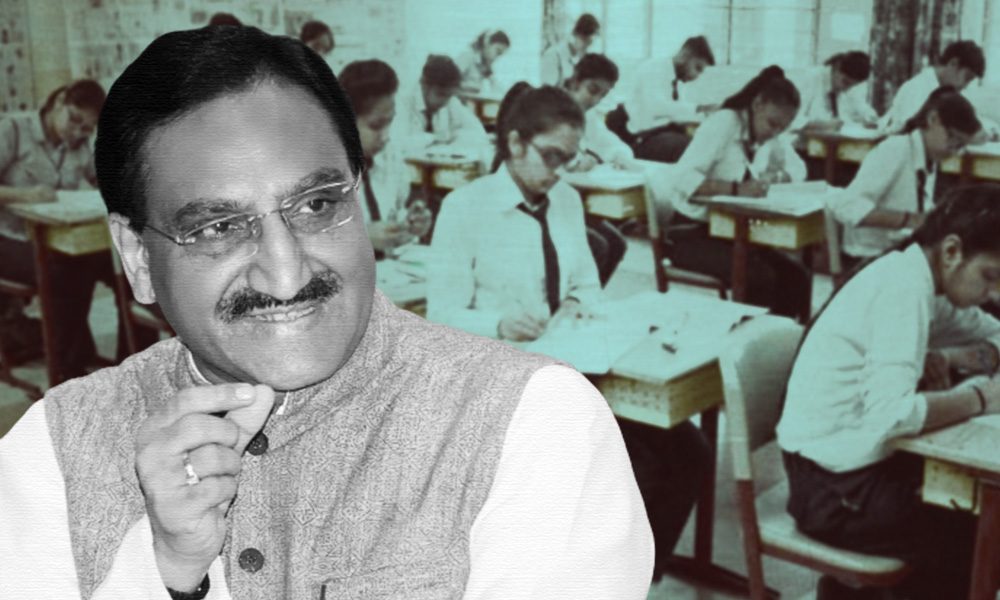
Image Credits: TOI, JagranImages
CBSE Removes Chapters on Secularism, Citizenship, Nationalism From Syllabus
Writer: Palak Agrawal
Palak a journalism graduate believes in simplifying the complicated and writing about the extraordinary lives of ordinary people. She calls herself a " hodophile" or in layman words- a person who loves to travel.
India, 8 July 2020 5:14 AM GMT | Updated 8 July 2020 8:25 AM GMT
Editor : Prateek Gautam |
A free soul who believes that journalism, apart from politics, should stand for social cause and the environment.
Creatives : Abhishek M
" An engineer by profession, Abhishek is the creative producer of the team, graphic designing is his passion and travelling his get away. In more ways than one, he makes the content visually appealing."
The decision to rationalize the syllabus for the new academic year was announced by HRD Minister Ramesh Pokhriyal Nishank to offset the academic loss caused by the COVID-19 pandemic.
The Central Board of Secondary Education (CBSE) on Tuesday, July 7, 'rationalized' the syllabus for classes 9 to 12, reducing the chapters by 30% while attempting to retain the core concepts due to COVID-19 situation.
The decision to revise the syllabus was announced by HRD Minister Ramesh Pokhriyal Nishank.
"Looking at the extraordinary situation prevailing in the country and the world, CBSE was advised to revise the curriculum and reduce course load for the students of classes 9 to 12. To aid the decision, a few weeks back I also invited suggestions from all educationists on the reduction of syllabus for students and I am glad to share that we received more than 1.5K suggestions. Thank you, everyone, for the overwhelming response," Ramesh Pokhriyal tweeted.
"Considering the importance of learning achievement, it has been decided to rationalize syllabus up to 30 per cent by retaining the core concepts," he said.
Looking at the extraordinary situation prevailing in the country and the world, #CBSE was advised to revise the curriculum and reduce course load for the students of Class 9th to 12th. @PMOIndia @HMOIndia @PIB_India @MIB_India @DDNewslive @cbseindia29 @mygovindia
— Dr. Ramesh Pokhriyal Nishank (@DrRPNishank) July 7, 2020
To aid the decision, a few weeks back I also invited suggestions from all educationists on the reduction of #SyllabusForStudents2020 and I am glad to share that we received more than 1.5K suggestions. Thank you, everyone, for the overwhelming response.@PIB_India@MIB_India
— Dr. Ramesh Pokhriyal Nishank (@DrRPNishank) July 7, 2020
📢Considering the importance of learning achievement, it has been decided to rationalize syllabus up to 30% by retaining the core concepts.@PMOIndia @HMOIndia @HRDMinistry @mygovindia @transformIndia @cbseindia29 @mygovindia
— Dr. Ramesh Pokhriyal Nishank (@DrRPNishank) July 7, 2020
The Minister had said that the Centre had asked educationists for suggestions on how to reduce the burden on students.
"I am glad to share that we received more than 1.5K suggestions," he tweeted. "Thank you, everyone, for the overwhelming response."
Chapters Axed By CBSE
The chapters that were deleted during the revision process includes sections on Citizenship, Nationalism, Secularism, Understanding Partition & Democratic Rights across multiple subjects, according to the documents uploaded on the board's website.
Among five chapters scrapped from Social Science in Class 9 are Democratic Rights, which the board said has been completely removed.
The curriculum for Class 11 students included chapters on Peasants, Zamindars and the State, Understanding Partition and sections on 'Revolt in The Countryside' which were based on farmers' agitation against moneylenders, have been removed.
Additionally, topics including Federalism, the need for Local Governments, Growth of Local Government in India, which fall under a section titled Indian Constitution at Work, have been removed from the subject of Political Science in Class 11.
In the subject of Sociology, chapters on Social Structure, Stratification and Social Processes, and Environment and Society have been removed for Class 11.
Also Read: Life-Saving HIV Drugs Risk Shortage As COVID-19 Disrupts Supplies: WHO
 All section
All section














